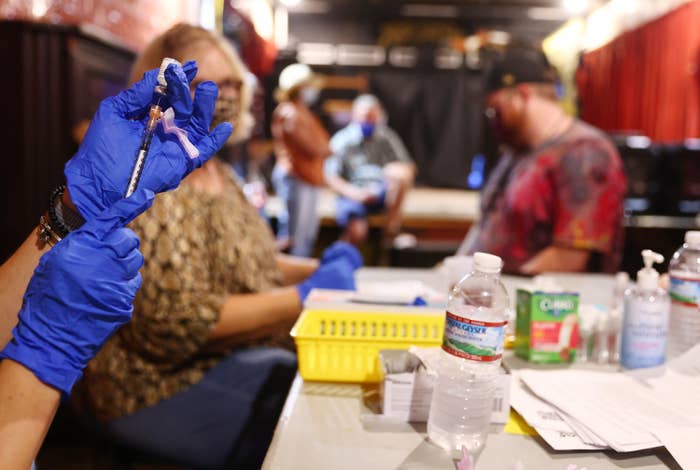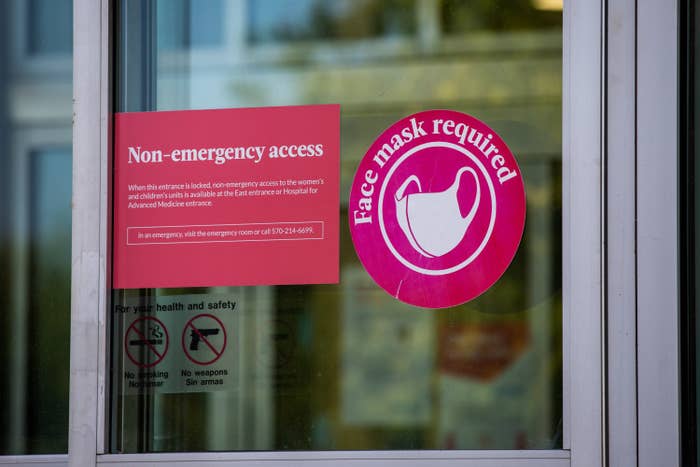
Ashley A. had not planned on getting vaccinated against COVID-19. She said she was terrified of needles, and concerned about the pace at which the vaccines had been developed and authorized for emergency use. Her friends and family shared conspiracy theories about the vaccines and were vocal about their distrust in the science behind the shots. She’d wanted to wait and see how others reacted to their shots before deciding whether to get it.
“At first I was like, I'm not doing it, you know, I don't want to be the guinea pig,” she told BuzzFeed News.
As a medical officer at a prison in California, Ashley A. (who asked to omit her last name so she could speak freely) had access to weekly COVID-19 tests. Her workplace also started offering the vaccines to staff in December, but she kept declining.
And then, in July, an earth-shattering event changed her mind: A close friend who Ashley A. considered a sister was hospitalized with COVID-19 and died.
“She was doing OK and then she wasn't. She was scared and alone and it broke me,” Ashley A. said.
Knowing a lot of people in her life would not get vaccinated, she decided she would overcome her anxieties and get the shot to protect them, believing that it would make her less likely to transmit the virus. “I don’t want to be a danger to them,” she said. “I don’t want to lose someone like that again, I can’t go through that.”
One week after her friend’s funeral, Ashley A. received the single-shot Johnson & Johnson vaccine.
Ashley A. was one of more than 430 people who responded to BuzzFeed News’ callout to readers who were vaccinated against COVID-19 in the summer. We set out to discover why some people waited months after the shots became widely accessible to the public before getting it.
After fulfilling massive demand in the first few months of the year, vaccination rates began plummeting by mid-April. Officials offered everything from free entry to city attractions to $1 million lotteries to encourage people to get the vaccine. And for a few weeks in the early summer, it almost felt like life was returning to a prepandemic state in many parts of the country. Concerts came back. Stores reopened. People went out with little fear, and, after the CDC’s announcement that vaccinated people did not have to wear masks in most situations — an announcement that shocked some public health experts — without masks.
Then the Delta wave hit. The country is now going through yet another déjà vu moment: Case counts are spiking, hospitalizations are soaring, and daily case records are being broken. Since younger people in the US are less likely to be vaccinated, they’re now making up a bigger share of those falling sick and dying of COVID-19.
Vaccination rates have slowly climbed in the last month, as city and state governments began mandating COVID-19 vaccines for some indoor activities and certain professions. But the increase is not happening fast enough to blunt the current COVID-19 wave.
“Nothing is going to get better until we increase our vaccination rates,” Monica Gandhi, an infectious disease specialist at the University of California San Francisco, told BuzzFeed News.
In late July, the CDC reversed its mask guidance for vaccinated people. “The unvaccinated, by choice, are a threat to public health at this point,” Amesh Adalja of the Johns Hopkins Bloomberg School of Public Health told BuzzFeed News at the time.

Most people who responded to our callout were not virulent anti-vaxxers. Some faced barriers that were systemic, like not being offered time off from work to recover from their shot. Others had concerns rooted in the country’s history of racism in the medical system. A number of pregnant people had been worried about whether the vaccine would affect their babies. (While the CDC issued new guidance last week strongly recommending that pregnant and breastfeeding people get their shots because of their increased risk of complications from COVID-19, only around 22% of pregnant people have gotten at least one dose of the vaccine.)
Many simply wanted to see how the vaccines impacted people around them before getting it themselves, including Jourdana, who lives on the East Coast. “Ultimately, I am a wait and seer,” said Jourdana. She got vaccinated in late July after seeing her vaccinated friends and colleagues experience no unexpected side effects.
But this strategy has had deadly consequences for some. A 39-year-old man in Las Vegas who wanted to wait a year before getting the vaccine died of COVID-19 in late July, after texting his fiancé, “I should have gotten the damn vaccine,” Fox 5 reported. And according to local reports, several hospitalized COVID-19 patients told their loved ones that they wanted to get the vaccine before they ultimately died.
"Life is moving on ... I was beginning to feel left out."
Morgan, a 30-year-old in San Diego who got vaccinated in early July, craved the freedom that their vaccinated loved ones had — a feeling many respondents shared.
“Life is moving on,” Morgan said. “I was beginning to feel left out and also fearful that they would carry the infection and it would infect me.”
Many also said they got their vaccines as they felt their circles dividing into “vaccinated” and “unvaccinated” camps and were uncomfortable about being among the latter.
One of the reasons Joe, a 27-year-old from New York, got the vaccine in July was because establishments were enforcing different rules for the vaccinated and the nonvaccinated. “It got to the point where I felt a bit embarrassed when my colleagues or other people mentioned whether I was vaccinated or not,” Joe said.
Becky Rooney also felt similarly at work one day in June when her employer announced that vaccinated staff did not need to wear their masks, following the CDC’s guidance. Everyone around her “ripped their mask off” and cheered, she told BuzzFeed News, and she felt awkward and singled out.
A dancer who was contracted at a theme park at the time, Rooney thought the vaccines were developed too quickly and wanted to wait for full FDA approval before getting her jab. (Three of the vaccines available in the US have received emergency authorization. To grant full approval, the agency must review much more data and conduct inspections on manufacturing facilities. Anthony Fauci said in early August that he was hopeful it would come by the end of the month.)
The COVID-19 vaccines were developed at a remarkable pace, backed by upwards of $18 billion in funding from the Trump administration’s Operation Warp Speed and an unprecedented urgency brought on by a global pandemic. Scientists have also researched mRNA vaccines for decades.
But for Rooney, being the one of the few at work who wasn’t vaccinated made her feel like an oddity.
“I just felt like there was a huge spotlight on me and that I just felt kind of judged,” she said. “That was one of the deciding factors that was making me like, All right, maybe it's time for me to go out and get vaccinated.”
Two days later, on a whim, Rooney pulled up to a Rite Aid and got the Johnson & Johnson shot. Still, she felt like she was pressured into getting vaccinated before she was fully ready to do so.
“I was like, I just wanna get this over and done with. I don't want to think about it anymore, I don't want to feel judged, I don't want to feel embarrassed,” she said.
For dozens of respondents, it was the threat posed by the highly contagious Delta variant that did it for them.
Unvaccinated people make up most of the new COVID-19 cases and an overwhelming majority of severe cases that lead to hospitalization or death. The vaccines provide significant protection against the disease, including against the new variants; the CDC’s data has shown that more than 99.999% of fully vaccinated people have not died or been hospitalized due to COVID-19.
A CDC study in late July that looked at a COVID-19 outbreak in Provincetown, Massachusetts, suggested that vaccinated people who get infected with the highly contagious Delta variant, though overwhelmingly protected from severe illness, can carry a similar amount of virus as unvaccinated people. In other words, because of Delta, some vaccinated people may be able to infect others too. Some public health experts have cautioned that circumstances around the outbreak — which involved exceedingly crowded bars, restaurants, and other indoor and outdoor venues — are “not necessarily representative” of the daily activities of a vaccinated person.
“This happened in an outbreak setting where people were very closely contacting other people. If you are in tightly packed indoor venues getting exposed for hours, just having a vaccine alone is not going to protect you from getting infected,” David Dowdy, an infectious disease epidemiologist at Johns Hopkins Bloomberg School of Public Health, told BuzzFeed News. “What the vaccine does is it gives your immune system a head start, if you will, in fighting this virus.”
Jenny, a 39-year-old from Arizona, said she too was waiting for full FDA approval before getting the vaccine. But she decided to get vaccinated in July. As Jenny wrote, “This Delta variant is scary as hell.”
Some were motivated by upcoming trips overseas and the expectation of vaccination requirements.
A number of people also said they finally got their shots because of vaccination mandates by colleges and employers, where community safety is paramount.
“The more people you have who are not immune, the more people you have who are able to maintain transmission within communities,” Dowdy said, adding that getting vaccinated is the "easiest, safest way" to build immunity.
“Our personal choices do not just affect us, they affect those around us as well whether we want them to or not,” Dowdy added. “And this is obviously especially true for an infectious disease.”
Ashley, an 18-year-old from Hillsdale, Michigan, said her college’s vaccine requirement was the tipping point for her mom to come around on allowing her to get vaccinated. After doing her own research, Ashley said she wanted the vaccine but, because she was 17 at the time, she required her mom’s permission to do so.
Her mom was hesitant, she said, until her school, Elmhurst University, announced that all students had to be fully vaccinated to return to campus. Ashley said she was relieved to not have “another difficult conversation” with her mom about the vaccines.
“My mom relented when my college released its statement,” she said.
For many people, however, it wasn’t just one thing that made them change their minds. For those like Jessica Mireles, a stay-at-home mom of four in Houston, it was a combination of several factors that inched them across the line.
Mireles had seen firsthand what a bad case of COVID-19 looks like — her mom came down with the virus in December. She struggled to breathe and was in a lot of pain, Mireles said. “When I would call her on the phone she sounded like she was running on a treadmill. She was like, [gasping sounds], breathing so fast and so hard that you could barely understand her,” she told BuzzFeed News.
Her mom eventually recovered, but the weeks Mireles spent worrying that she could lose her were terrifying, she said. When the vaccines became available to them in Texas, her parents immediately signed up for it.
Mireles shot down her mom’s repeated pleas for her to get vaccinated over the next few months. She was afraid of the long-term effects of the vaccines and worried the development process was rushed. But when her husband went back to work in an office and decided to get vaccinated in March, she watched as he stopped wearing his mask, went out to meet clients, and visited restaurants and stores. Mireles felt a pang when she saw her husband going about with a sense of freedom that she did not have.
One day in July, as the Delta variant raged across the country — and particularly in Houston, where there was a massive outbreak at the time — Mireles was visiting her parents’ home when she caught a doctor being interviewed on cable news about rising case counts and hospitalizations. “He said, ‘if you're not vaccinated yet, you probably have about two weeks until you catch the Delta variant,’” Mireles recalled.
That was the final straw. The very next day, she got her first dose of the Moderna vaccine.
